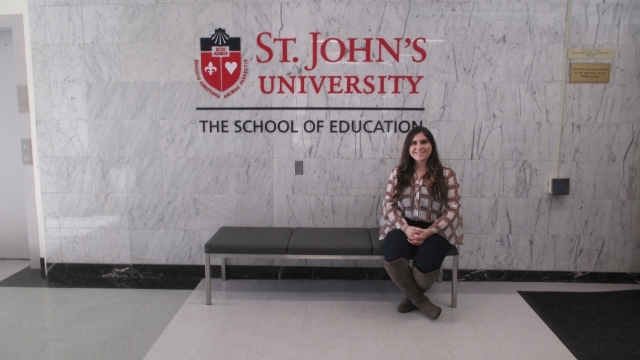
"Social justice was something I started thinking about quite a lot, and in more detail, in the latter years of undergraduate studies," says Nicole Rodriguez '19Ed '21GEd. With the support of Liz Chase, Ed.D. and Bilge Cerezci, Ph.D. both assistant professors in the Department of Curriculum and Instruction, and Leah Mortenson, Instructor in the department, Rodriguez is now researching social justice in teacher education. The focus of the study is on pre-service teachers' understanding of social justice in education, and is aimed at understanding potential improvements to teacher preparation programs.
Rodriguez first became involved in the research with Chase the semester before beginning her yearlong Residency Internship for St. John's Educators (R.I.S.E.) Program. "Dr. Chase posed a general question of interest to all incoming R.I.S.E. residents," recalls Rodriguez, "and it was coincidentally the time when I was really reflecting on my own privilege and thinking about social justice in the context of my upcoming student teaching experience."
From that moment forward, Rodriguez began to peel back layers of her own privilege and understand what it means to be a teacher that values social justice and equity in education. Biweekly meetings were held for the purpose of establishing a foundation for the discussion of equity and access in education. Other members of the research team included seniors Tatyana Williamson and Nicole Lawrence. A common language around the research topic was formed in the group by the shared reading of The Dreamkeepers: Successful Teachers of African American Children by Gloria Ladson-Billings. Rodriguez emphasized the impact of this text on many of the group's discussions.
The team's research question asks, "How do pre-service teachers understand social justice in education, and their role in shaping/sharing/extending that knowledge for others?" Data was collected from forty pre-service teachers and included student-researcher led focus group interviews, written reflections on social justice readings, responses from student reflections, and critical race reflections.
The team presented its research in a poster session at the opening of the Academic Center for Equity and Inclusion (ACEI) at St. John's. Preliminary results of the study indicated that pre-service teachers had access to the "right" language about social justice in education, but that it was limited. Despite familiarity with the language typical of social justice, inclusivity, and equity in the classroom, the preliminary results showed that ambitious commitments to academic achievement, cultural competence, and sociopolitical consciousness were lacking.
For Rodriguez, this experience has evolved into service to her fellow Education students. First helping to lead activities for her cohort members in senior year, Rodriguez now assists Chase, Cerezci, and Mortenson in planning and facilitating seminar days for current R.I.S.E. students.
In addition, the team is working on a research piece for Kappa Delta Pi International Honor Society in Education focused on pre-service and in-service teachers creating more equitable classrooms and enhancing their own understanding of social justice in education. Rodriguez adds, "Now, our research team is beginning to think about a larger article that encompasses qualitative data from the experiences of the current and the former cohort of student teachers."
